February 22, 2017
More Books on the Radio
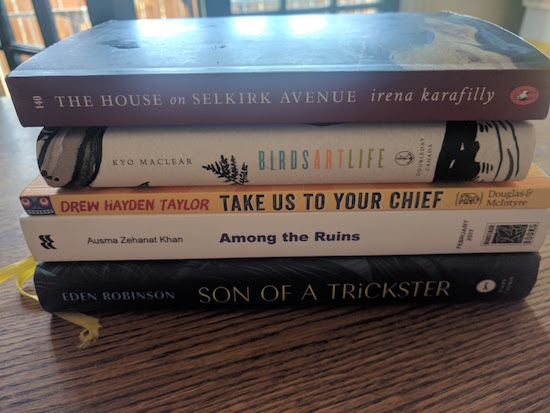
I’m not kidding when I tell you that all I ever really wanted from this life was a books column on the radio, and so my spots on CBC Ontario Morning are indeed the culmination of a dream as well as a great deal of pleasure. What a thing: to get to talk about books you love. Today I talked about this excellent stack of reads, and if you didn’t hear it, you can listen again on the podcast. I come in at 40.40.
February 22, 2017
Where I’m Calling From
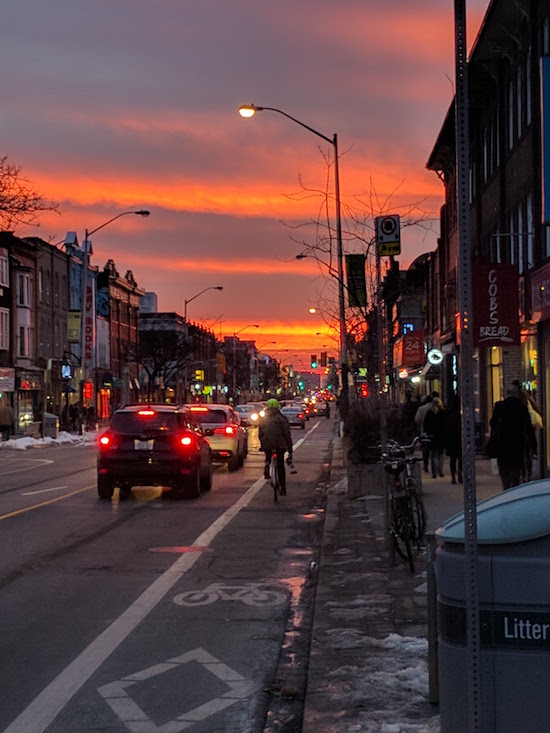
My book exists in the world, it does. I haven’t seen it yet, but it’s being couriered to my house this morning and so at some point in the not-distant future I will be holding it in my hands. Which I’m looking forward to, and not, because I much prefer anticipation to the fleetingness of a single moment. When a carton of The M Word anthologies arrived on my doorstep three years ago, I cried and cried, and not necessarily because of happiness. I remember feeling like kind of a fraud, because I’d published this book, but it wasn’t really my book, and while I was proud of it (and I still am) it felt somehow illegitimate. Would I ever be a real writer? And this, of course, is always the question.
And yet somehow I am a real writer, if the definition of the term is that I have deadlines coming up, just so I don’t have a single moment to take a breath before the book’s release. Which I’m not complaining about. The alternative would be no deadlines, and then I wouldn’t be a writer, and so I go forth, making it up as I go, which is the only way I’ve ever gone. In this way, being a blogger has been a tremendous boon to my writing life. Making it up as we go is our raison d’être.
Thankfully, apart from the flurry (and gift) of work, everything else is quiet—knock wood. We spent a long and low-key weekend partaking in the weird Spring-in-February weather, which I refuse to feel bad about because weather is weather. You take what they give you. The children continue to be funny and interesting, and also very very loud, but we know where they got that from. And the books pile up, and so many of them continue to be exceptional, original—there’s no running out of ideas yet. I love to read. I do so love to read, better than I love almost anything.
“Would you choose me or books,” my family asks me, and I always take the former, but not before hesitating. And not without some reluctance.
How fortunate we are to live in a world where both is not necessarily a spoil of riches.
February 19, 2017
Speedy Deletion: How I Tried and Failed to be on Wikipedia
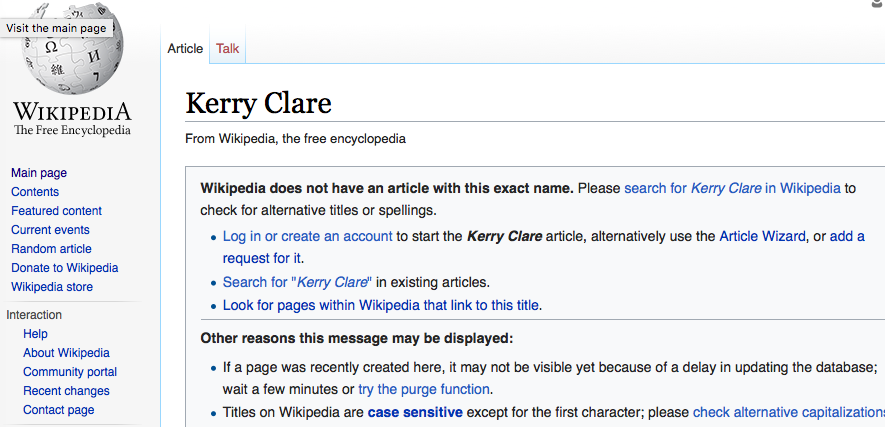
Because I tell you everything, you have to know that I’ve wanted a Wikipedia page since 2008. This was the year my friend got a Wikipedia page. At the time, I barely had a “Published Works” page on my website, and my website was on Blogspot, and I had a long, long way to travel still. And all these details are a little shameful to admit, because we’re all supposed to be cool about this sort of thing. Like, “Oh, do I have a Wikipedia page? I had no idea, because I certainly don’t google myself weekly.” In my next life, I hope to be that cool, but in this life, I’m the woman who finds every mention of me or my work two days before Google Alerts does. Just once I would like Google Alerts to surprise me—for me this would be a definition of success. It would mean not only that my online mentions were turning up in substantial volumes, but also that I have better things to do than hunt about on the internet looking for them.
Anyway, last summer I decided that the time had finally arrived. I’d amassed a small body of work, some prizes, publication credits, and had a debut novel on the horizon. Because it would be cheating to create my own Wikipedia page (although I have been told that this happens all the time) I asked my husband to make mine for me, a really romantic gesture. And he did. It was really nice, and there I was amongst Canadian authors, and Canadian authors born in 1979, even. But it hadn’t even been a day before the Kerry Clare wiki was causing trouble.
The trouble at the start was kind of innocuous. They wanted references and citations, and this was understandable. There was nothing personal about it. I filled in the blanks and added the details. And then the next problem flagged was that my page was not connected to other pages, or referenced by them. Never mind—I’d fix that too. I connected my page to that of authors who’d been published in my anthology; I linked to an author who’d published me in her anthology. If I could I would have literally underlined that I am in fact a National Magazine Award-nominated author, or bolded the text at the very least. And this, the fact of being a National Magazine Award-nominated author, is really a very Canadian thing—you don’t even have to win. But the Wikipedia editors didn’t know this. (Perhaps “this” is also kind of sad. Don’t think I didn’t consider it.)
It was about four days into my career as a person with a Wikipedia page that things got more personal, that the notes on the discussion page began to be written by actual people as opposed to the template messages about links and additional citations. The people, who volunteered their time as Wikipedia editors, were not at all impressed by my accomplishments. And for awhile, I tried to engage with the process, to answer their questions, to fill in the blanks, to vouch for my own notability. But the more I tried, the more adamant the editors became. “Being nominated for an award does not make a person notable,” the editor explained. “She didn’t win the award. And her publication date is so far off into the future that it is likely, especially with the current state of publishing, that her book will never in fact be published.”
At this point I finally gave up. Although saying this suggests I had more agency in the matter than I actually did. Even if I hadn’t given up the fight to be on Wikipedia, I was on the shortlist for speedy deletion and it was probably going to happen anyway. But when I did give up, it was because it had dawned on me that battling to remain on Wikipedia was going to have to become my full-time job, and it was exhausting. Turns out I’m not so unnotable that I had absolutely nothing else to do with my time except battle it out with Wikipedia editors. If I’d devoted my life to staying on Wikipedia, I’d never be able to do anything else that was notable again.
I know some people who are as notable as dirt stuck to the bottom of my shoe, and they’re still on Wikipedia. How, I wonder, have they managed to pull it off? Perhaps it’s such a feat of incredible endurance that it makes a person notable after all?
A few lessons I took away from this: first, that the whole exercise is remarkably gendered. (The dirt on the bottom of the shoe people I refer to are male.) It was not lost on me that I am a woman who does have some accomplishments, and that my work was entirely dismissed without hesitation by a group of men who really knew nothing about those accomplishments, and who did not necessarily have any accomplishments of their own. Perhaps I am wrong about this final point, and I would be ecstatic if I were, in fact, but it does occur to me that profoundly successfully (or notable people) don’t necessarily have the time to be editing Wikipedia in the middle of the night. Anyway, the idea of mediocre men undermining a successful woman was not so mind-blowing—I don’t know where exactly, but I’ve heard that one before…
And the second lesson? That it’s really healthy for a person (especially a person who googles herself on a regular basis) to be reminded of her insignificance. I’m not being facetious. And that Wikipedia notability and other such metrics are not those with which we should necessarily gauge our success in the world. I mean, it would be nice, but these aren’t the things that matter. It’s good to know too one can be a total failure in all these respects, and still be entirely happy, and worthy of existence.
February 14, 2017
Romantic Deal-Breakers
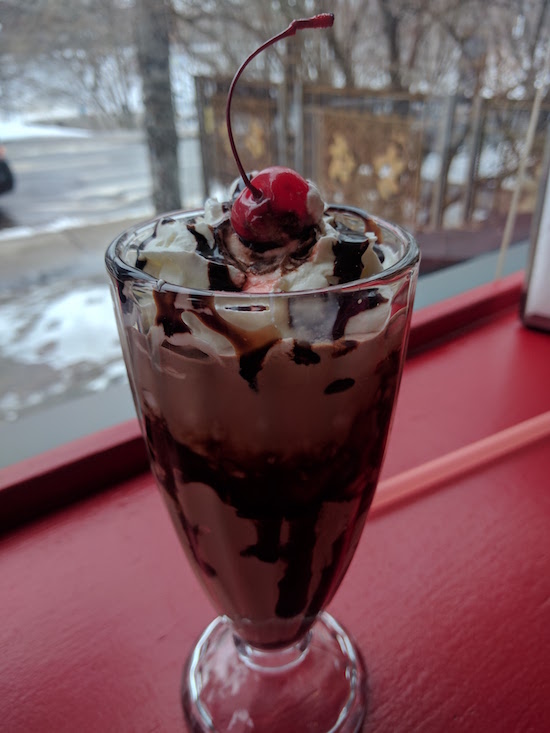
I was happy to take part in a feature at the Globe and Mail in which authors nominate the one book that would be a deal-breaker if you discovered it on a potential partner’s bedside. For me there was no question! Read here to find out the title. And hope you all had sweet Valentines Day, whether it be sweetened with chocolate or cake.
February 13, 2017
Lillian Boxfish Take a Walk, by Kathleen Rooney
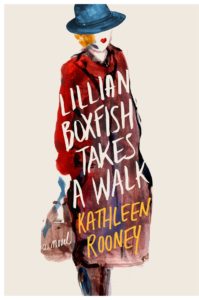 The book everybody’s talking about this season, in my circles at least, is Lillian Boxfish Takes a Walk, by Kathleen Rooney, which I first saw described as Mad Men meets Mrs. Dalloway, or, in other words, as a love letter written directly to my heart. Mad Men because Lillian Boxfish worked in advertising, albeit thirty years before Peggy and Joan, writing copy for R.H. Macy, and she achieved some fame as the highest paid ad woman in America, as well as for her books of Dorothy Parker-esque light verse which sold well in their time. And Mrs. Dalloway because of how the novel is framed in a similar fashion, around a single evening, the last night of 1984 as Lillian Boxfish—old as the century [or actually a year older than that, if you want to get really specific, although she doesn’t]—walks around the New York City she’s seen change around her over the decades. Places on her walk prompting flashbacks to the fascinating story of her career, her marriage, her fame, and various downfalls. In some ways, this is a very easy book, definitely a breezy book, but that to use that point as a dismissal would be to ignore the richness of its language. This is the first book I’ve read in a while which had me pulling the dictionary off the shelf to look up new words, and that makes perfect sense, not just in that Rooney herself is a poet whose attention to language is unsurprising, but so too is her character, Lillian Boxfish (inspired by real-life figure Margaret Fishback). Which reminds me of what Joan Didion wrote about her time working at Vogue where, she writes:
The book everybody’s talking about this season, in my circles at least, is Lillian Boxfish Takes a Walk, by Kathleen Rooney, which I first saw described as Mad Men meets Mrs. Dalloway, or, in other words, as a love letter written directly to my heart. Mad Men because Lillian Boxfish worked in advertising, albeit thirty years before Peggy and Joan, writing copy for R.H. Macy, and she achieved some fame as the highest paid ad woman in America, as well as for her books of Dorothy Parker-esque light verse which sold well in their time. And Mrs. Dalloway because of how the novel is framed in a similar fashion, around a single evening, the last night of 1984 as Lillian Boxfish—old as the century [or actually a year older than that, if you want to get really specific, although she doesn’t]—walks around the New York City she’s seen change around her over the decades. Places on her walk prompting flashbacks to the fascinating story of her career, her marriage, her fame, and various downfalls. In some ways, this is a very easy book, definitely a breezy book, but that to use that point as a dismissal would be to ignore the richness of its language. This is the first book I’ve read in a while which had me pulling the dictionary off the shelf to look up new words, and that makes perfect sense, not just in that Rooney herself is a poet whose attention to language is unsurprising, but so too is her character, Lillian Boxfish (inspired by real-life figure Margaret Fishback). Which reminds me of what Joan Didion wrote about her time working at Vogue where, she writes:
“…I learned a kind of ease with words…a way of regarding words not as mirrors of my own inadequacy but as tools, toys, weapons to be deployed strategically on a page. In a caption of, say, eight lines, each line to run no more or less than twenty-seven characters, not only every word but every letter counted.”
Looking back at her life, Rooney has Lillian Boxfish contemplating the way the public’s relationship to words have changed, the way that the ads she wrote in the 1930s assumed a level of cleverness and awareness of language that contemporary advertising no longer seems to aspire to. Where she finds that same sense of fun and play with language, she remarks, is in the rap music she hears on the streets of New York, a city that’s so much grittier and dangerous than the city she arrived at in her youth. And yet all of it still draws her in, the sounds, the sights, the people all stirring her curiosity. She strikes up conversations and always asks a person’s name, and they get talking, and the moral of every single one of their stories is that people are people, regardless of time or place. Lillian Boxfish sees the humanity, the beauty, in all of it. And so we get to too.
February 9, 2017
Ada Lovelace: Poet of Science, by Diane Stanley and Jessie Hartland
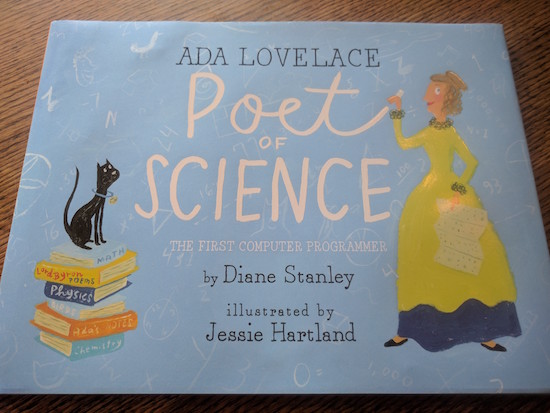
Harriet and I went to see the remarkable Hidden Figures on the weekend, and until the picture book version of the story is released, we will content ourselves with Ada Lovelace, Poet of Science: The First Computer Programmer, by Diane Stanley, illustrated by Jessie Hartland, which was recently selected by the America Library Association among the top ten feminist picture books of last year. (We also know Ada Byron [later Lovelace] as a character from Canadian author Jordan Stratford’s middle-grade series, The Wollstonecraft Detective Agency.)
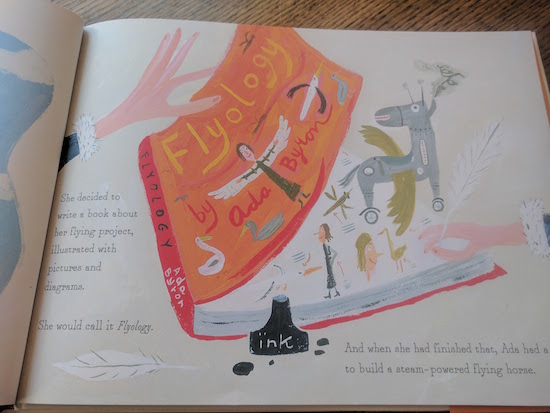
True confession: I don’t understand computer programming. It’s possible that a lifetime of being told that math is hard made me believe that math is hard, or maybe I just find math hard, but my mind doesn’t work that way. I’ve read Ada Lovelace: Poet of Science several times, and while I understand in theory how Ada imagined Charles Babbage’s Analytical Engine worked based on symbols and rules of operation changed into digital form…I actually don’t even understand it in theory. Ada Lovelace’s ideas were inspired by mechanical looms which wove textiles based on patterns dictated by punched cards. I don’t really understand that either.
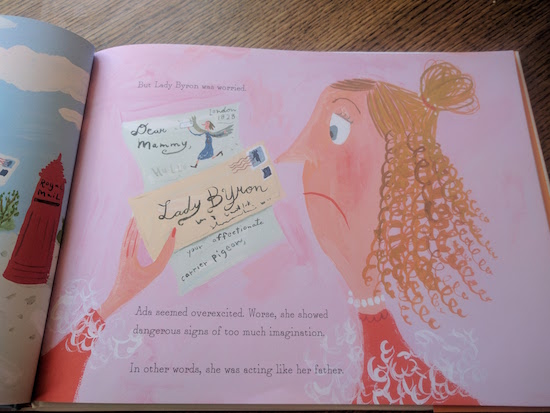
But but but. There is more than one way to be a person, to be a woman, to have a brain. That such things befuddle me is not to say that women are like that and let’s all go back to rocking babies, but instead to say that some women have an aptitude for such things, and it’s useful for even those of us who don’t to realize this. It’s like saying, Maybe I don’t need feminism, but some women do. (Nobody ever says this though. People who don’t need feminism seem to forget the possibility of second clauses.) To be honest, I’m not sure my daughter is going to grow up to be a computer programmer either, genes being what they are, but I will insist on the fact that she knows it’s a possibility. I mean, if a girl could have been one two hundred years ago, before there were even actual computers, then maybe today there are perhaps no limits of what a girl can grow up to be. And isn’t that excellent?
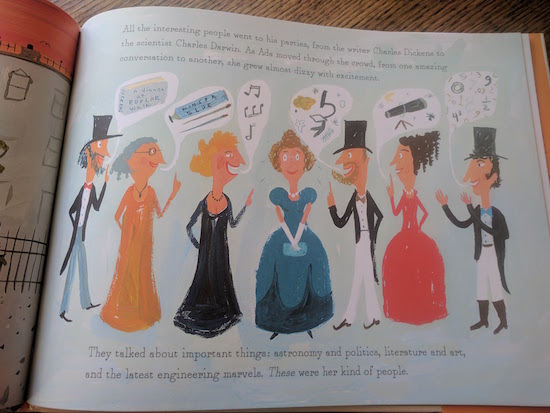
We love this book, about Ada (who gives Rosie Revere, Engineer a run for her money) who has a spectacular imagination, despite her mother’s attempts to school her in logic and rational thinking in order to override her passionate poet father’s genetic legacy. As women of her station had to do, she settled down and married, but that wasn’t the end of her story, and she would go on to do remarkable things in her too short life, indeed becoming the world’s first computer programmer with Babbage’s analytical machine. And what is especially interesting is that there is no direct link between Babbage’s and Lovelace’s work and the development of modern computers, although as Stanley’s author’s note points out, Alan Turing would read their work after they resurfaced after a century of obscurity. But still, I am fascinated by this idea (which is so recurrent in feminism) that some ideas have to be invented over and over again. Or perhaps it’s more miraculous than that—that the great discoveries don’t just happen once, and that progress ain’t a line, but that spectacular bursts of excellence are exploding all the time.
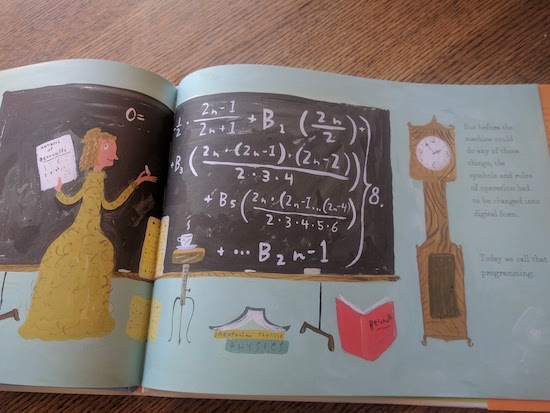
February 7, 2017
The hair has a jacket.
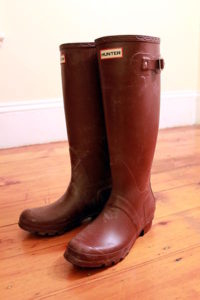 Someone tweeted a photo of Airforce One not long ago, its repulsive occupant on board, and occupant’s jacket was draped around his chair in a most peculiar way, as though the chair was wearing it. “Look! The chair has a jacket!” I tweeted in response, not remotely with wit, except that I actually made a typing error, and my reply in fact read, “Look! The hair has a jacket.” Completely lunacy. And I now have visions these days of running into crowded rooms and screaming this phrase, to everybody’s confusion. Who is that strange person?
Someone tweeted a photo of Airforce One not long ago, its repulsive occupant on board, and occupant’s jacket was draped around his chair in a most peculiar way, as though the chair was wearing it. “Look! The chair has a jacket!” I tweeted in response, not remotely with wit, except that I actually made a typing error, and my reply in fact read, “Look! The hair has a jacket.” Completely lunacy. And I now have visions these days of running into crowded rooms and screaming this phrase, to everybody’s confusion. Who is that strange person?
Somehow between now and my book’s publication, I have to acquire some social skills. I also need to find footwear that isn’t a pair of dirty green rubber boots and a coat that is not in fact a giant duvet with sleeves, if I have any home of creating an impression of the author that isn’t “vagrant.” Vagrant who has forgotten how to smalltalk and keeps pointing out how the hair has a jacket.
February 5, 2017
Birds Art Life, by Kyo Maclear
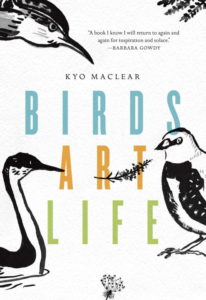 “…what he really taught me was that the best teachers are not up on a guru throne, doling out shiny answers. They are there in the much beside you: stepping forward, falling down, muddling through, deepening and enlivening the questions.” —Kyo Maclear
“…what he really taught me was that the best teachers are not up on a guru throne, doling out shiny answers. They are there in the much beside you: stepping forward, falling down, muddling through, deepening and enlivening the questions.” —Kyo Maclear
In her book, Mommyblogs and the Changing Face of Motherhood, my friend May Friedman refers to the value of “critical uncertainty in practice,” as opposed to “the generalizing trap of expert discourse.” Indeed the best blogs, and life itself, are all about “stepping forward, falling down, muddling through, deepening and enlivening the questions.” And while Kyo Maclear’s new memoir, Birds Art Life, is no blog—its prose is polished perfect; by design, the book is an object most exquisite—it has a bloggish spirit, with its wide vistas, room to wander, and the miraculous and serendipitous way that one thing seems to lead to another.
It’s not a book about birding, or even discovering birding—it’s a book that’s far more vicarious, and stranger than that. Here is a book about a year Maclear spent hanging out with a birder, figuring out what makes him tick. Developing a passion for birds in the process, but that’s not the point of this memoir. Yes, there are birds, but it’s also about family, and history, about caregiving, marriage, waiting, reading. About darkness, and prisons, and action in dangerous times. It’s about cities and nature, about the hearts of things and also their edges.
“Life and death. Survival and extinction. The common and the rare. The robust and the disappearing. I had come to see that birding was about holding opposites in tension. It elicited a twoness of feeling—both reassuring and dispiriting—especially in a city where so little landscape had survived modernity’s onslaught. In that twoness was a mongrel space between hope and despair.” —Kyo Maclear
I’ve loved Kyo Maclean’s work since reading her first novel, The Letter Opener, in 2008. In 2012, she released her second novel Stray Love along with the picture book, Virginia Wolf, and created a list at 49thShelf of Picture Books for Grown-Ups, and what I love about Birds Art Life is that she’s now herself created such a thing. First, because the book is illustrated with photographs of birds by her birding friend, Jack Breakfast, and also with Maclear’s own line-drawings, which add whimsical charm to the pages in a the fashion of Maira Kalman. And second, because of how the stories in this memoir contain echoes of her picture books, works that are so rich in thoughtfulness and wisdom—and now grown-up readers get to read it all too.
But it’s a particular kind of wisdom. I feel as thought Maclear herself would feel uneasy with being declared as wise, but it’s the kind of wisdom she’s talking about in the excerpt I quoted at the beginning of this post. The kind of wisdom that comes from falling down, from enlivening questions, rather than supposing there are even answers.
The year Maclear captures in her memoir is a dark one, although it comes with requisite moments of light. But she’s been caring for her father during a period of illness; she’s still negotiating her relationship with her mother; she worries about her younger son and identifies with his anxiety; close to the end of the year, two close friends of their family are imprisoned in Egypt and news of their fate is held in fear and uncertainty. And as I read this book yesterday, I was thinking that this is precisely the very book I need to be reading right now, not to escape from the things outside my door that make me afraid these but instead to “enliven the questions.” A book that—like so much that I’m reading these days, like so many books that are saving my life—helps me negotiate that space between hope and despair.
Leaning towards the hope, even.
February 3, 2017
My Beautiful Birds, by Suzanne Del Rizzo
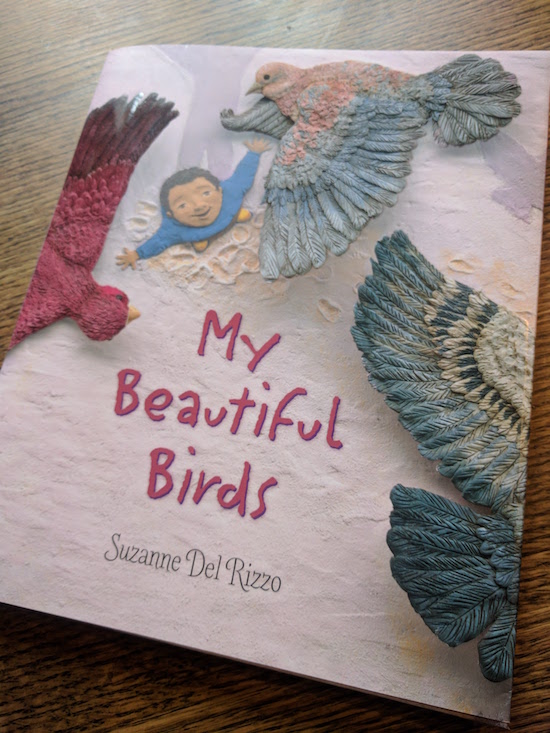
As weird and terrible as the world can be, I don’t spend a lot of time, as the modern problem goes, worrying about “how I’m going to explain it to my children.” As I’ve written before, I relish awkward conversations. But I was thinking about this idea yesterday, about how incongruous it must be to be both a parent and somebody who wants to see refugees restricted from finding sanctuary in their country and community. What do these people teach their children about helping others, I wonder. Do they ever worry about the gap between their messages?
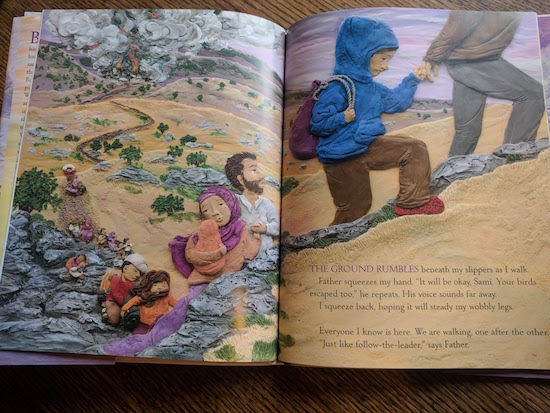
“As a parent,” somebody told me on Twitter this week, “my job is to protect my children from danger.” Hence their support of UnpopularDonald’s Muslim Ban. And the logical next question, although I didn’t ask it because this was Twitter and there was really no point, is “Isn’t that precisely what so many refugee families are doing though? And so surely as a parent then, you can recognize the humanity in these people, that they are guided by the same impulses that direct you, except that their homes have been destroyed by years and years of war and your fear is based on a sense of otherness and is also statistically irrational?”
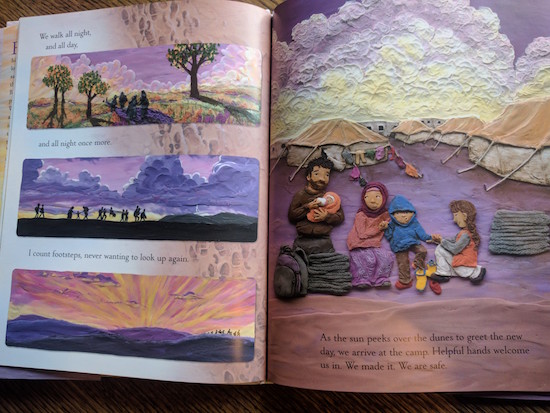
The first time I was happy after November 9 2016 was a few weeks later at the Canadian Children’s Book Awards, and not just because I’d had more than a few glasses of wine. But it was because of the spirit that night, the speeches of the presenters and winners that acknowledged the darkness of the moment we’re currently embroiled in and that books really were one sure way to kick at the darkness, children’s books in particular. Books that bridge the distance between here and there, between us and them, and recognize the humanity common to all of us.
In Suzanne Del Rizzo’s picture book, My Beautiful Birds, a young Syrian boy is forced to leave his wartorn home and make the long journey to the relative safety of a refugee camp. The story is enlivened by Del Rizzo’s plasticine illustrations with their rich purple and golden hues. Of all the things that Sami has left behind. it’s his pigeons he misses the most, the birds he fed and kept and as pets. Although his family does their best to create a home in the camp—planting a garden, buying things in the small shops started by their neighbours—this new life is anything but sure: “Days blur together in a gritty haze. All I have left are questions. What will we do? How long will we be here?” The idea of the birds and their freedom symbolizing everything that’s been lost to Sami.
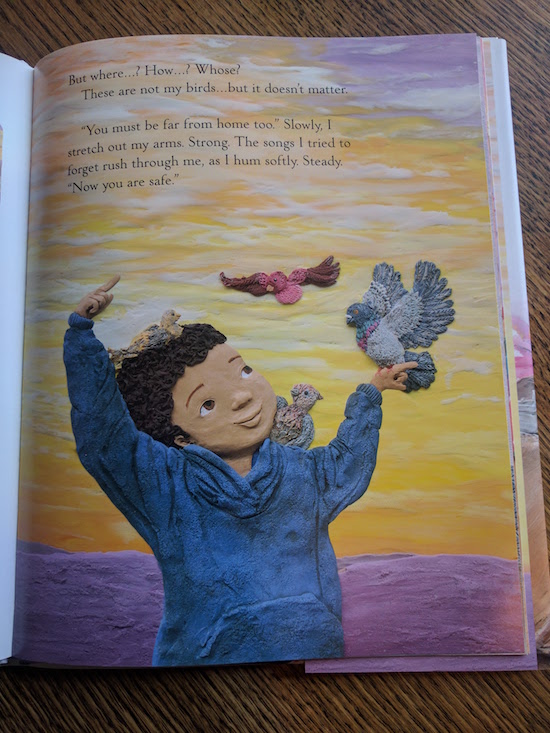
Del Rizzo shows Sami’s grief and sadness with thick black lines that overwhelm the pictures he tries to paint of his beloved birds, the black paint taking over his art like a storm. Where he finds solace, though, is in the sky, one thing that is familiar to him, “wait[ing] like a loyal friend for me to remember.” In the clouds, he sees the shapes of his birds: “Spiralling. Soaring. Sharing the sky.”
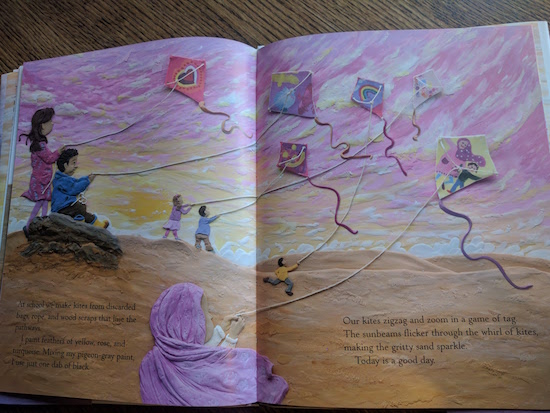
January 31, 2017
Mitzi Bytes Cover Reveal!

It’s been a long time coming, but man oh man it was worth the wait. I am officially in love with the final cover for my novel, Mitzi Bytes, which arrives in the world in just a few short weeks from now, on March 14. Lots of events on the calendar, and I hope to see you out at some of them! If you haven’t pre-ordered the book yet, you can do so at your local bookshop or online at Chapters Indigo or Amazon. You can also make sure it’s on order at your local library, and add it your shelf on Goodreads.
Grateful to everybody for so much support!





